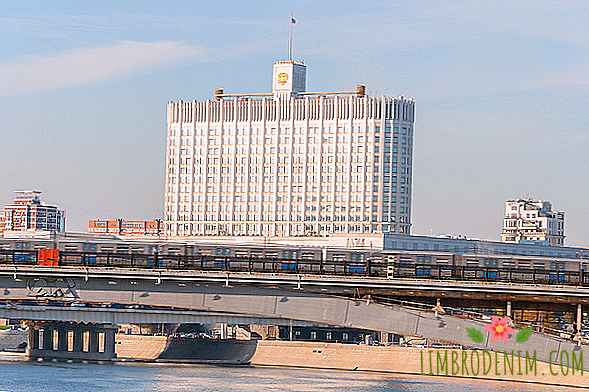Moscow - Berlin: How I was disappointed in emigration
Surely more and more of your friends are leaving abroad. Maybe you even envy them: they come to visit and tell how good it is there. How else? After all, if you left, you are well done and happily start a new better life. To admit that something is going wrong is embarrassing. But this is exactly what happened to me: I learned what nostalgia is, I understood how to be disappointed in emigration - and how to overcome disappointment.

Moving
The idea of living abroad came to me after graduation. At first it was just an abstract thought. I perceived emigration as a rung of the social ladder, on which it would be nice to climb, so that life would certainly succeed. Several years have passed. I worked as a journalist and wrote on social and political issues. I liked my life in Moscow less and less. What was going on oppressed: political processes after Bolotnaya, corruption, savvy laws and reforms from a common sense point of view, human tragedies and unequal struggle with the state — I, as a journalist, needed to delve into all this, and I took it to heart.
In order to step back, I began to write about the economy - I remember, I joked that "I went into internal emigration." But it got me into a career dead end. The working conditions were excellent, but there was no feeling that I was doing my and my favorite thing. I no longer understand where to go. I couldn’t manage to forget about what is happening around me - then more sanctions and a collapse of the ruble were added to everything. I walked around the once-beloved city and felt insecure, I felt anxiety, now hopelessness. When my husband got a job in Berlin, I happily started packing my suitcase.
We moved in August 2015. I did not have a strong euphoria: I tried not to be fascinated, not to be disappointed. But nevertheless, the environment in which I got was beautiful with its comfort: clean air, clean water, convenient transportation and short distances — everything was done for a person, and the person was respected here. But the main thing was a sense of security: as if I had slipped free and the iron curtain was about to slam behind my back.
Clean air, clean water, convenient transportation and short distances - everything was done for a person, and the person was respected
True, it was hard to part with friends. I dreamed that we walked together for a very long time, all night; and when I woke up in the dark, I felt the distance between us — so unbearable, as if I needed to crawl over these two thousand kilometers to see people close to me. The next morning I calmed myself: if it really becomes unbearable, I will take a ticket. And, of course, did not fly anywhere.
At first there were no other problems. Arriving in Moscow, I noted the smell of gasoline, dirt on the roads, the hustle on the subway and the decadent mood, to once again say to myself: "It's so good that I left." When I met nostalgic émigrés in Berlin, I laughed at them: “They are sad because they have forgotten the true state of things. A couple of hours in Moscow’s traffic jam and nostalgia will pass.”
I remember that I was amused by the ethnic landmark of Berlin - the Stolichny store with Russian products. On the entourage, he reminded me of the store of my childhood in the mid-nineties: the Oreshek cookies with condensed milk, ryazhenka, bagels, halva were crowded on poorly lit shelves. The seller joked, releasing the sprat by weight. At the exit of the store, a certain Sergey grilled kebabs on the grill, selling it for three euros each. Immediately drank beer men in sweat pants, women in fur coats and heels - also like those who recently survived the restructuring.
“We buy cottage cheese only at Stolichnoye,” the acquaintance explained to me. "Move to Berlin to go to the other end of the city for sour Russian cottage cheese, when the store on the corner sells for a little bit different, but fine German - this will never happen to me," I thought. I stopped reading the Russian news, zealously began to take on German and threw out of the house a set of matryoshkas left over from the previous tenants.
Disappointment
The first two years in Berlin I spent on maternity leave. In the four months before my son was born, I managed to learn German to the B1 level (intermediate) - that was enough for life and communication. I could not work in the journalistic specialty (and didn’t really want to), so I decided to get a German education and a new profession. It seemed to me that as soon as I left the decree, I quickly and easily adapted.
During this time, I satisfied the desire to "live abroad", and the magic of the move has evaporated. When I left the decree, I realized how much needs to be done in order to achieve at least the level that was in my native country. I moved to improve life, but life has not improved much. Everyone knows that adapting is not easy, but only those who have moved - as far as.
Before emigration, I had the illusion that if you try hard, you can fully integrate into another society. Now I had to admit: I will always be in this country a little stranger. The longer I thought, the more questions arose: were such efforts worth the advantages of living here? Will I be able to adapt at all? It lay in the plane of the material - and therefore, was fixable. Nostalgia put me down, she was uncontrollable and seemed irremediable.
The Berlin winter came, dull and snowless, like Moscow November, three months long, and I had a seasonal blues. When spring came, I was not happy, but I was stuck in time. It seemed that the course of things, which fastened the unpredictable life, was disturbed, as the child was organized and soothed by the rituals - the lullaby of the mother and the beloved night light. Yes, I want everything to fall asleep with snow, frost and blizzard. Long to wait for spring, the streams of melting snow, the smell of damp earth, and then another to grumble in the May cold. I do not need more warm days in a year - I need as many of them as there were.
I laughed at them: "A couple of hours in a Moscow traffic jam - and nostalgia will pass"
I began to go out a little - it was hard to look at other people's dark houses. Due to the fact that there were no native images around, the mechanisms that "included" my feelings disappeared. I can not experience, for example, "bright sadness and memory from childhood," because there is no one near the very gray Khrushchev, at the entrance of which smells of dusty concrete. People also did not want to look. The Germans decided to express feelings more restrained. Everything here felt as if the person had some tweaked settings - it’s hard to understand what the other person is experiencing.
I had strange desires - for example, I wanted a handkerchief with a Khokhloma pattern. I thought about caviar with Borodino bread, reread Tolstoy, revised Soviet comedies. And even studied vacancies in Moscow - she began to draw something very distant and cute, with fluffy snow and New Year's lights. At some point, I realized that I live as a tourist who was delayed on a journey. The sights are viewed, the streets are well-worn, the postcards have been sent, but the plane has been canceled, and you are all sitting in this city, suddenly becoming a stranger and boring, and waiting. I didn’t even plan for a long-term business: wait a bit - and we will go on a trip or to Russia. It is desirable for a little longer. When I studied at the university, a girl lived with me in a dormitory who was always waiting for something: holidays, trips home, springs — she had already crossed out the next day in the calendar in the morning to bring the desired date closer. I remembered her and was scared. I had to admit: I started having nostalgia. I missed Russia and was disappointed in emigration.

Errors
Disappointment is a logical stage of adaptation in a new country, following euphoria. Behind him come a gradual acceptance and simultaneous existence in the space of two cultures. But not everyone “lives” before: someone comes back home, someone gets stuck without adapting - everyone has heard about people who have been living in other countries for decades, desperately criticizing everything local, praising everything Russian, but not returning.
I studied how other people were experiencing a move: the symptoms were similar, but the problems were different - some immigrants often find complaints of others far-fetched. It seems that I managed to isolate the reasons for my own disappointment, because of which it was much more difficult to adapt.
The first of these is the idea of a new life, which will start from scratch along with the move. It seemed to me that, having got into a prosperous environment with friendly, non-corrupt officials, good roads, decent wages, good medicine, I somehow automatically automatically live better somehow. But no. Even in the most hospitable new country to build life is not easier. If I could give advice to myself of the past, I would say: “Be ready, that there is a long way to a comfortable life. You need to go only if you are in a good place at a new place, and ideally your favorite work. And you must first learn the language - the worse you prepare for the move, the more difficult it will be to start. " Moving for someone in a fit of romantic feelings is, of course, easier, but you pay for it with a hard adaptation.
It seemed to me that, having got into a prosperous environment with friendly officials, good roads, decent salary and medicine, I would automatically live better.
The second problem is flight from oneself. If I had to emigrate today, I would try to separate the inner discontent with the discontent with the fact that I can not change. Instead of admitting that I don’t like being a journalist and I haven’t achieved the desired success, I thought something like this: "The situation in the country is difficult, the media is closing, creative people have a bad life, so I cannot build a career here." This, of course, is true, but only in part. Today, before escaping from a difficult external environment, I would try to make another effort to arrange my life as I would like, in my homeland — until I really understood that nothing depends on me anymore.
However, how long is it worth overcoming the resistance of the external environment? Is it possible to give such advice to a businessman, whose business is squeezed? Or, for example, a doctor, teacher or scientist? This is a question to which I have not yet found an answer: how to divide the real and illusory danger from the state?
Finally, the third reason is idealization. So it was in my case: running from oneself and life from scratch combined with the idea that a distant country had no flaws at all. As a result, a beautiful but unreal image emerged - and the disappointment of colliding with reality. The main conclusions to which I came: it is important not to emigrate with weapons in the fight against their internal conflicts. It is better not to run away from problems, but to move from a position of strength, as prepared as possible.
Overcoming
I began to get out of a difficult condition when I confessed that I was dissatisfied not with Berlin, but with myself. Somehow, walking down the street, I decided: analyze everything that causes my rejection. For example, I do not like the closeness of the Germans. And then I realized: no, it's not the Germans "closed" - I just can not understand them. Even though I speak quite well, I still make an effort when talking, I can not joke, talk heart to heart. Communication has become a background stress. I myself unconsciously closed myself from people and exist as a bystander: I don’t smile at them, don’t study them, I don’t start conversations - if only they don’t speak to me. But everything is in my hands: I must learn the language as well as I can. As soon as I analyzed everything that I did not like, the oppressive gloomy situation retreated.
Now I am learning to think wider. I do not think that my life in Russia is over, but that I have two houses: Moscow and Berlin. Twice more opportunities and responsibilities. Someone advises to bite the bullet and burn the bridges, but, in my opinion, this is violence against oneself. I decided that if I wanted to, at first I should go to Russia more often and “recharge” so that it would be easier to leave the comfort zone. Ideally, I would like to work remotely, be based in Moscow, but live in other countries for a long time - so that you can always experience the euphoria of novelty, and then return to your homeland. Two councils of my emigrant friends helped me: not to confuse nostalgia with longing for youth and not to move (or not to stay) for the sake of the children - often they become the last argument in the dispute. Children are unlikely to appreciate the efforts of their parents (and should not!), And unhappy parents are much worse for them than a not very prosperous homeland.
In March, I returned to visit Moscow and finally saw the snow. It was presidential election day. The sun was shining brightly. I walked the streets, smiling widely. As a tourist, I wanted to take everything on the phone: frozen Chistye Prudy, old houses in the lanes of Sretenka. Everything has gained depth and meaning. The euphoria lasted one day. When dusk came, the ballot box consumed my thin and impotent ballot. And soon Kemerovo happened.
My attitude towards emigration has changed. Now it is not an indicator of success, but a difficult and interesting experience. And I realized that I would never be able to replace my homeland with a new country - but if I had decided now, I would have moved again.
Photo:AR Pictures - stock.adobe.com, bychykhin - stock.adobe.com





